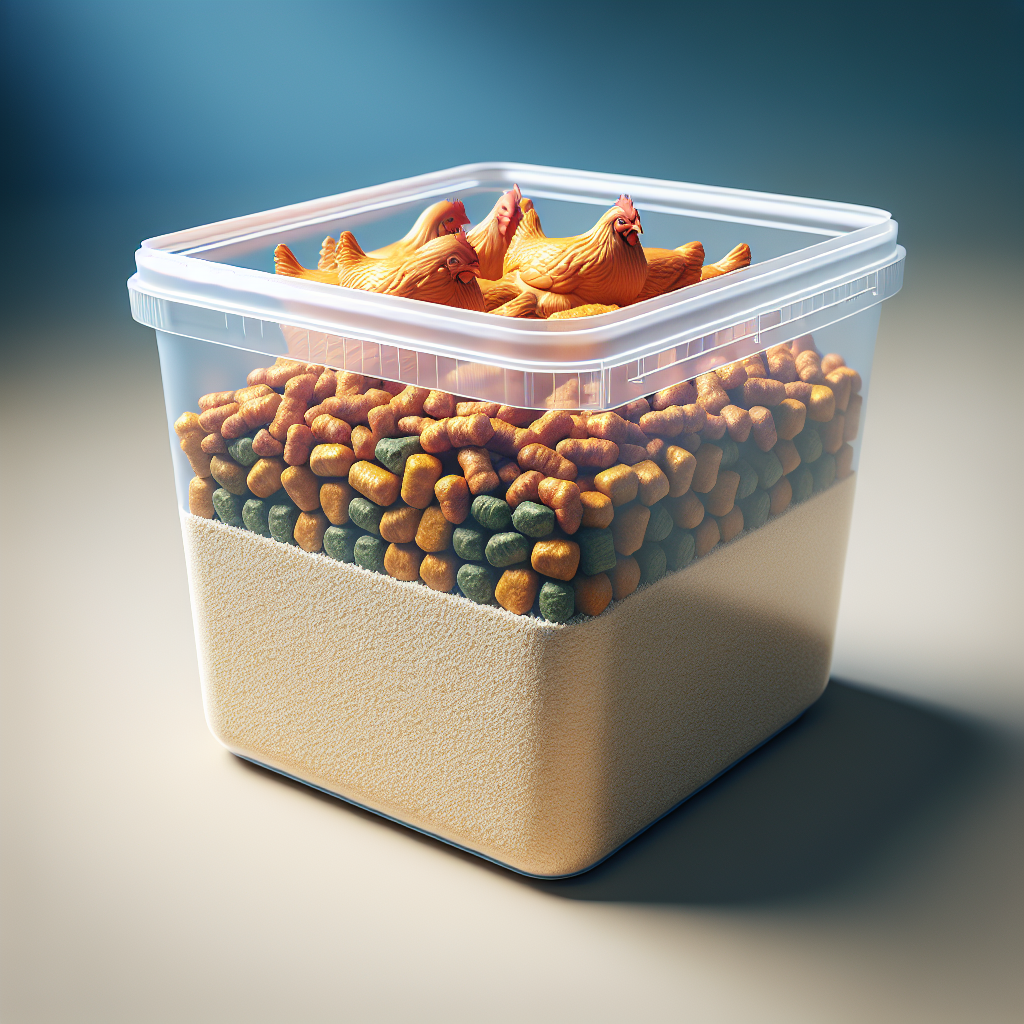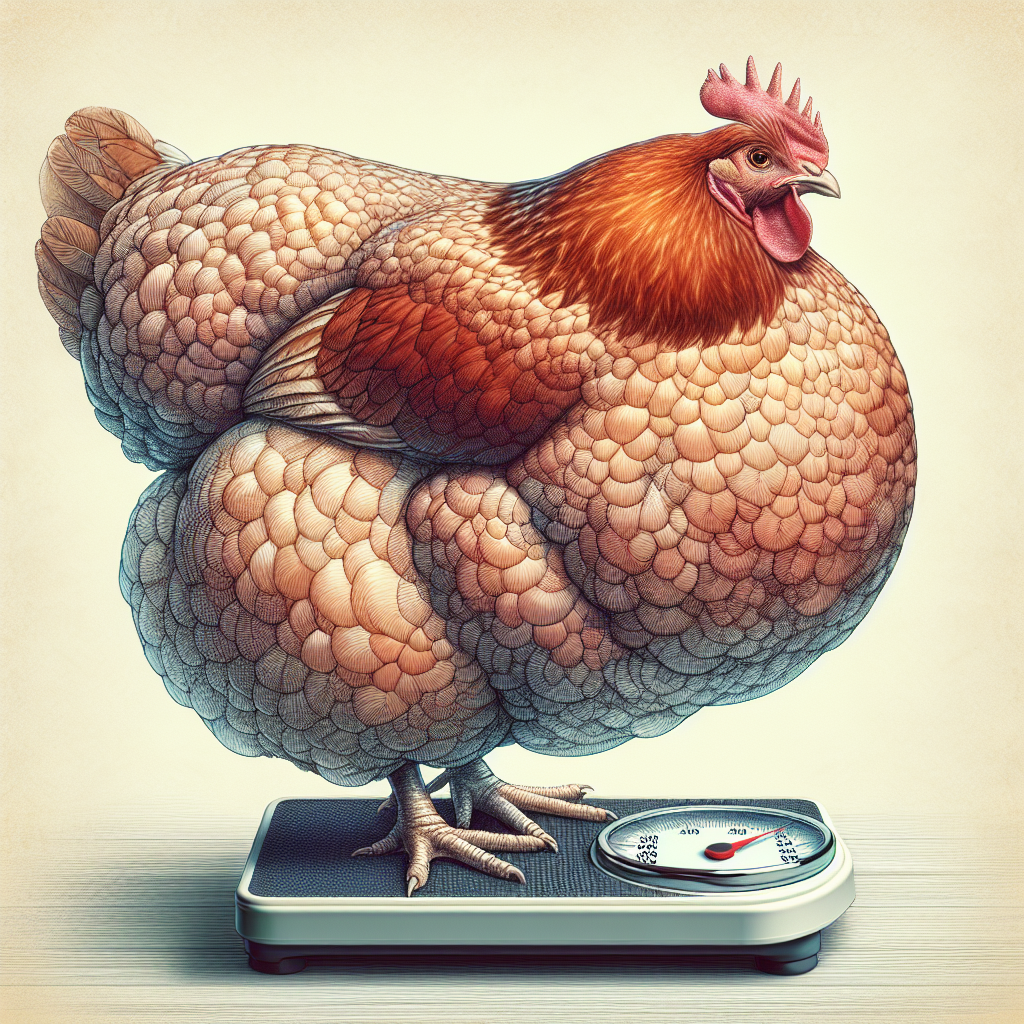If you’re a proud owner of chickens, you know that keeping them healthy and happy is of utmost importance. One key aspect to consider in maintaining their wellbeing is the storage of their feed. It’s essential to store chicken feed properly to ensure its freshness and prevent any form of contamination. In this article, we will explore effective methods and essential tips to store chicken feed, enabling you to provide your feathery companions with high-quality nutrition while keeping them safe from any potential hazards. So, let’s dive into the world of chicken feed storage and ensure that your feathered friends get the best possible care.
Choosing the Right Container
Plastic containers
When it comes to storing chicken feed, selecting the right container is crucial. Plastic containers are a popular choice due to their durability and affordability. Look for food-grade plastic containers that are specifically designed for storing animal feed. These containers are made from materials that are safe for storing food and are resistant to absorbing odors or leaching harmful chemicals into the feed.
Metal containers
Another option for storing chicken feed is using metal containers. Metal containers offer added protection against rodents and pests that may try to chew through plastic containers. These containers are typically made from galvanized steel or aluminum, making them resistant to rust and corrosion. However, it’s important to ensure that the metal used is food-grade and free from any coatings or paints that could contaminate the feed.
Food-grade containers
Regardless of whether you choose plastic or metal containers, always opt for food-grade options. Food-grade containers are specifically manufactured to meet strict safety standards, ensuring that no harmful chemicals or substances will leach into the feed. These containers are marked with a food-grade label or symbol, indicating their suitability for storing food items. Investing in food-grade containers is essential for maintaining the freshness and quality of your chicken feed.
Proper Storage Location
Dry and cool area
To maintain the freshness and quality of your chicken feed, it is vital to store it in a dry and cool area. Moisture can lead to the growth of mold and spoilage, while excessive heat can cause the feed to break down and lose its nutritional value. Choose a storage location that is well-ventilated and away from any sources of dampness or humidity, such as basements or laundry rooms.
Away from direct sunlight
Direct sunlight can speed up the degradation process of chicken feed, causing it to break down and lose vital nutrients. Therefore, it is important to store the feed away from direct sunlight. Find a storage location that is shaded or invest in opaque containers that block out UV rays. By keeping the feed in a dark environment, you can ensure its freshness and prevent premature spoilage.
Off the ground
Storing your chicken feed off the ground is essential to prevent contamination and keep it safe from pests. Elevating the containers on shelves or pallets will minimize the risk of rodents or insects accessing the feed. Additionally, storing the feed off the ground will help maintain airflow, reducing the chances of moisture buildup and mold formation.
Sealing the Container
Tightly sealed lid
Properly sealing your chicken feed container is essential to keep it fresh and prevent spoilage. Choose containers with tightly sealed lids that create an airtight barrier. This will help preserve the feed’s nutritional value and prevent the entry of moisture, pests, and contaminants. Inspect the lid regularly and replace it if it shows signs of wear or damage.
Using airtight bags or containers
Using airtight bags or containers is another effective method for sealing chicken feed. Airtight bags are particularly useful for smaller quantities of feed. They can be sealed using zippers, clamps, or heat seals to create an airtight barrier. If you opt for airtight containers, ensure that they have secure locking mechanisms to prevent any accidental spills or openings.
Avoiding moisture exposure
Moisture is one of the biggest enemies of chicken feed freshness. Even with proper container seals, it’s important to take extra precautions to avoid any moisture exposure. Ensure that your storage area is adequately insulated and protected against leaks or water sources. Additionally, avoid placing cold or wet feed directly into the containers, as condensation can form and lead to spoilage.
Avoiding Contamination
Separate storage space for different feeds
If you own chickens of different ages or have specific dietary requirements, it is important to store different feeds separately. Mixing feeds can lead to contamination and cross-contamination, potentially affecting the health and nutritional balance of your chickens. Dedicate separate storage areas or containers for each type of feed to ensure proper segregation and minimize the risk of contamination.
Regular cleaning of storage area
Maintaining a clean storage area is crucial for preventing contamination of chicken feed. Regularly clean the storage space to remove any spilled feed, dust, or debris. Use non-toxic cleaning agents and ensure that everything is completely dry before placing the feed back into storage. A clean environment will deter pests, bacteria, and mold from proliferating and ensure the feed remains fresh and safe.
Prevent pests and rodents
Pests and rodents are common nuisances that can contaminate chicken feed. To prevent their presence, take proactive measures. Close any gaps or cracks in the storage area that could serve as entry points for pests. Consider installing pest-repellent devices or traps as a preventative measure. Regularly inspect the storage area for signs of pests or rodents, and take immediate action if any are found.
Monitoring Feed Quality
Regularly inspect for signs of spoilage
Regular inspections of your chicken feed are vital to ensure its freshness and quality. Check for any signs of spoilage, such as a musty odor, discoloration, or the presence of mold or insects. If any abnormalities are detected, discard the affected feed immediately to prevent any potential health issues for your chickens.
Check for signs of insects or pests
Monitoring your feed for signs of insects or pests is crucial in preventing the spread of contamination. Look out for any unusual holes, droppings, or live insects in or around the feed containers. If you spot any signs of infestation, take immediate action to eradicate the pests and dispose of the contaminated feed appropriately.
Monitor feed storage time
Chicken feed, like any other perishable product, has a limited storage life. Monitor the feed storage time to ensure you are using it before it reaches its expiration date. Keep track of when you purchased or received the feed and calculate its shelf life accordingly. By rotating your feed supply and using older batches first, you can ensure that you are feeding your chickens the freshest possible feed.
Preventing Feed Odor
Avoid mixing various feeds together
Mixing different feeds together can lead to the formation of unpleasant odors. To prevent this, store each type of feed separately in dedicated containers. Avoid combining feeds, especially those with strong smells, as the odors can transfer and affect the overall quality of the feed. Keeping your feeds separate will help preserve their individual aromas and prevent any unwanted odor mixtures.
Proper ventilation
Proper ventilation is crucial in preventing feed odor buildup. Ensure that your storage area has adequate airflow to dissipate any accumulated smells. If using airtight containers, consider opening them periodically to allow fresh air to circulate. This will help maintain the feed’s freshness and prevent any buildup of unpleasant odors.
Removing spoiled feed immediately
If, despite your best efforts, you notice any spoiled or foul-smelling feed, it is essential to remove it promptly. Spoiled feed not only poses a health risk to your chickens but can also contaminate surrounding batches. By removing the spoiled feed immediately, you can minimize odor and prevent the spread of any potential contaminants to other feed batches.
Using Desiccants
Choosing the right desiccant
Desiccants play a crucial role in preventing moisture buildup in your chicken feed. When selecting a desiccant, ensure that it is specifically designed for food storage and safe for animal consumption. Silica gel packets are a popular choice, as they are non-toxic and highly effective at absorbing moisture. Avoid using desiccants that contain harmful substances that could potentially contaminate the feed.
Placing desiccants correctly
Placement of the desiccants is essential for optimal moisture absorption. Ideally, desiccants should be placed directly inside the feed container, ensuring they are not in direct contact with the feed itself. This prevents any potential ingestion of the desiccant by the chickens. Follow the manufacturer’s instructions for the correct placement and quantity of desiccants based on the size and type of your feed container.
Periodically replacing desiccants
Desiccants have a limited lifespan and will eventually reach their moisture absorption capacity. It is important to periodically replace the desiccants to ensure their continued effectiveness. Regularly check their condition and replace them according to the manufacturer’s guidelines. This will help prevent any moisture buildup and maintain the freshness of your chicken feed.
Handling Bulk Feed
Storing in bins or silos
When dealing with large quantities of chicken feed, it is advisable to store it in bins or silos specifically designed for bulk storage. These containers are designed to hold and protect large volumes of feed, ensuring its freshness and preventing contamination. Bins or silos should be made from food-grade materials, have secure lids or covers, and be properly sealed to keep out pests and maintain optimal feed quality.
Using proper ventilation systems
Proper ventilation is crucial when storing bulk feed. Ensure that your storage system has adequate ventilation to prevent moisture buildup and mold formation. Some bins or silos come equipped with ventilation systems that facilitate airflow. Regularly inspect and maintain these systems to ensure continuous and effective ventilation for your bulk feed.
Rotating the feed supply
When storing bulk feed, it is important to practice feed rotation. Feed should be used in the order it was received or purchased, with older batches used first. This ensures that the feed does not exceed its recommended shelf life and maintains its optimal freshness and nutritional value. By rotating your feed supply, you can prevent waste and ensure that your chickens are always consuming the freshest feed available.
Preventing Moisture
Using moisture-proof containers
To protect your chicken feed from moisture, consider using moisture-proof containers. These containers are specifically designed to create a barrier against moisture, keeping the feed dry and fresh. Look for containers with rubber gaskets or seals to provide an extra layer of protection. Moisture-proof containers are particularly useful if you live in a humid climate or have a storage area prone to moisture buildup.
Keeping feed away from water sources
Ensure that your chicken feed is stored away from any water sources to prevent moisture contamination. Avoid placing it near leaky pipes, taps, or areas prone to flooding. Additionally, avoid storing the feed outdoors or in areas where it may be exposed to rain or snow. By keeping the feed away from water sources, you can significantly reduce the risk of moisture-related spoilage.
Properly sealing feed bags
For smaller quantities of chicken feed, such as those purchased in bags, proper sealing is essential to prevent moisture infiltration. After opening a bag of feed, seal it tightly to prevent any air or moisture from entering. Consider using bag clips, rubber bands, or resealable bags to maintain the seal. This will help preserve the freshness and quality of the feed until it is fully consumed.
Monitoring Feed Consumption
Keep track of feed usage
To ensure that you are providing an adequate and balanced diet for your chickens, it is important to keep track of their feed consumption. Monitor how much feed they consume daily to establish a baseline. This will help you adjust the feed amounts accordingly and avoid overstocking or underfeeding. Regular monitoring of feed consumption will ensure that your chickens receive the right amount of nutrition and help prevent feed wastage.
Avoid overstocking
Overstocking on chicken feed can lead to increased spoilage and waste. While it’s important to have enough feed to meet the needs of your flock, storing excessive amounts can result in feed going past its expiration date or being exposed to pests and moisture. Purchase feed in quantities that can be consumed within a reasonable timeframe, and avoid stockpiling unnecessarily.
Adjust feed amounts accordingly
Regularly assess the nutritional needs of your chickens and adjust the feed amounts accordingly. Factors such as age, breed, activity level, and weather conditions can all affect the amount of feed your chickens require. Consult with a poultry nutritionist or veterinarian to determine the appropriate feed amounts for your flock. By adjusting the feed amounts, you can ensure that your chickens receive the proper nutrition while also preventing unnecessary waste.
In conclusion, properly storing and maintaining the freshness of chicken feed is essential for ensuring the health and well-being of your flock. By selecting the right containers, storing the feed in an appropriate location, sealing the containers properly, and taking precautions against contamination and moisture, you can ensure that your chickens receive the freshest and most nutritious feed. Remember to monitor the feed quality, prevent feed odor, use desiccants when necessary, handle bulk feed properly, prevent moisture buildup, and monitor feed consumption to optimize your chicken’s nutrition and minimize waste. With these guidelines in mind, you can confidently store your chicken feed and provide your flock with optimal nutrition for their overall well-being.




